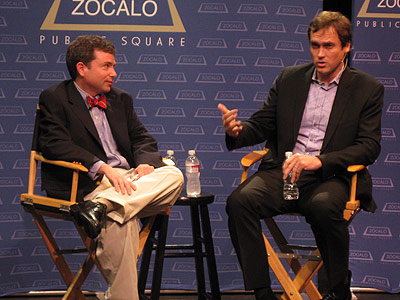Traffic is essentially "an engineering issue," says author Tom Vanderbilt. "But there's also a layer of culture." That layer of culture determines, to a large extent, how traffic can become a problem. This idea is explored in Vanderbilt's 2008 book Traffic: Why We Drive the Way We Do (and What It Says About Us), a Planetizen Top Book of the year. He recently expanded on that idea for a discussion about traffic put on by Zocalo Public Square in (where better?) Los Angeles.
Traffic is essentially "an engineering issue," says author Tom Vanderbilt. "But there's also a layer of culture."
That layer of culture determines, to a large extent, how traffic can become a problem. This idea is explored in Vanderbilt's 2008 book Traffic: Why We Drive the Way We Do (and What It Says About Us), a Planetizen Top Book of the year. He recently expanded on that idea for a discussion about traffic put on by Zocalo Public Square in (where better?) Los Angeles.
A write-up of the event and video of the discussion with UCLA researcher Eric Morris is also available.

Tom Vanderbilt (right) discusses his book "Traffic" with UCLA researcher and New York Times Freakonomics blogger Eric Morris.
People in L.A. love these sorts of discussions. We've got a mess of a traffic problem in this city -- from intense congestion to freeway domination to a late-blooming public transit system. Something about events focused on transportation and traffic just seems to pull people together here, almost like a support group. "Hi, I'm Nate, and I have a problem with traffic congestion."
The human impact of traffic is easy to see, but less apparent is the human cause -- a point made crystal clear by Vanderbilt's work. Obviously it's humans causing traffic, but what about humans is actually the source? What about how we act, interact and live makes a bunch of drivers into a traffic jam? Vanderbilt's book cites a lot of data that offers some indication. The data shows how men cause more of a certain kind of accident than women, or how teenagers cause more crashes when there are other teens in the car with them, or a variety of other demographic- and behavior-based conclusions. These may be fairly straightforward, but Vanderbilt's discussion brings up what may be a more important if underappreciated cause of most traffic: the lack of an interactive social structure in driving.
"Traffic has a lack of a feedback system," says Venderbilt. "There's no repeat interaction."
So if I never have to see you again on the road, am I really going to be as courteous as I would be if I saw you every day? Most people probably want to think yes, but their actions say no.
Vanderbilt cites the research of psychologist Philip Zimbardo, who researches why regular people can be convinced to do terrible or evil things. One of his explanations is a concept he calls de-individuation -- the act of disregarding other people as individuals. Vanderbilt draws the connection to traffic, where it's not a person driving a car next to you in traffic, but just a car. It's just a box on wheels -- and it's in your way.
Interaction between drivers is seen by many as a way to improve safety, but also a way to improve efficiency. If people have an idea about what others are going to do before they do it, they can react accordingly, or at least not be surprised. It's also the principle behind the move to remove signs from roadways. By removing that reliance on clearly defined rules, people are forced to fall back on their highly evolved but incredibly elemental communication skills. In the end, it's all about being cognizant of each other and working together to get where we all need to go. After all, that's not a finite resource. I can get to my job on time just as well as anyone else on the road, and my success does not limit theirs.
Maybe what we really need is a support group. Or at least the realization that, as fellow Interchange blogger Josh Stephens once wrote, we're not in traffic, we are traffic.

Planetizen Federal Action Tracker
A weekly monitor of how Trump’s orders and actions are impacting planners and planning in America.

Chicago’s Ghost Rails
Just beneath the surface of the modern city lie the remnants of its expansive early 20th-century streetcar system.

Amtrak Cutting Jobs, Funding to High-Speed Rail
The agency plans to cut 10 percent of its workforce and has confirmed it will not fund new high-speed rail projects.

Ohio Forces Data Centers to Prepay for Power
Utilities are calling on states to hold data center operators responsible for new energy demands to prevent leaving consumers on the hook for their bills.

MARTA CEO Steps Down Amid Citizenship Concerns
MARTA’s board announced Thursday that its chief, who is from Canada, is resigning due to questions about his immigration status.

Silicon Valley ‘Bike Superhighway’ Awarded $14M State Grant
A Caltrans grant brings the 10-mile Central Bikeway project connecting Santa Clara and East San Jose closer to fruition.
Urban Design for Planners 1: Software Tools
This six-course series explores essential urban design concepts using open source software and equips planners with the tools they need to participate fully in the urban design process.
Planning for Universal Design
Learn the tools for implementing Universal Design in planning regulations.
Caltrans
City of Fort Worth
Mpact (founded as Rail~Volution)
City of Camden Redevelopment Agency
City of Astoria
City of Portland
City of Laramie





























